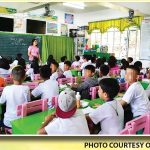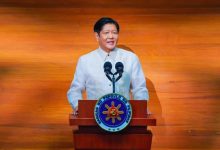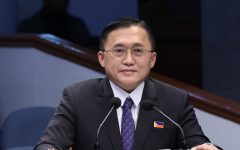SENATOR Christopher “Bong” Go lauded President Ferdinand Marcos, Jr. for signing into law Republic Act No. 11984, also known as the “No Permit, No Exam Prohibition Act” recently. Go co-authored and co-sponsored the measure in the Senate. It was principally authored by Sen. Bong Revilla and principally sponsored by Sen. Chiz Escudero.
The new law, taking effect 15 days after its publication in the Official Gazette or in a newspaper of general circulation, covers all public and private educational institutions, from the basic (K-12) level up to the higher education institutions, including technical-vocational institutions offering courses longer than one year.
“Education is a fundamental right and a key driver of economic development. Improved access to education will lead to improved economic opportunities and overall well-being for our kababayans,” he said.
In addition, Go noted that education is a powerful tool for breaking the cycle of poverty as “it provides individuals with the knowledge and skills necessary to secure stable employment, start businesses, and pursue higher education.”
“By increasing access to education, particularly for marginalized groups, the Philippines can help reduce poverty and inequality,” he added.
The new law provides mechanisms as well as penalties to ensure that institutions will not be able to prevent disadvantaged students from taking examinations and other educational assessments due to outstanding financial or property obligations, such as unpaid tuition fees.
The Department of Social Welfare and Development will define who are considered as “disadvantaged students”.
“Sa atin dito, ayaw natin maantala ang kanilang pag-aaral. Alam n’yo, napakabigat po n’yan kapag hindi sila makaka-exam. Instead na maka-concentrate, makatutok sa pag-aaral ang mga kabataan, pabigat ‘yun sa iniisip nila,” said Go.
Under the new law, no such educational institution shall impose any policy that prevents students with outstanding financial or property obligations from taking examinations or any form of educational assessment.
However, the students and/or their parents or legal guardians must execute a promissory note addressed to the educational institution concerned, indicating their commitment to settle their outstanding financial or property obligations within a reasonable period.
Meanwhile, cognizant of the success of Republic Act No. 10931, or the Universal Access To Quality Tertiary Education Act, signed into law by then president Rodrigo Duterte, Go co-authored this 19th Congress his SBN 1360 that seeks to expand the coverage of the tertiary education subsidy by amending RA 10931.
“Malaking tulong ito sa mga qualified Filipino students dahil magkakaroon na sila ng option upang makapag-aral sa institution na mas naaangkop sa mga kursong nais nilang kuhanin,” said Go.
“Patuloy tayong maghahanap ng paraan na mabigyan ng suporta ang ating mga estudyante upang hindi matigil ang pag-aaral ng ating mga kabataang Pilipino,” added Go.
Finally, Go also co-authored SBN 1864, or the Student Loan Payment Moratorium During Disasters and Emergencies Act, which aims to provide relief to students who have taken out loans but are unable to pay them back due to disasters and other emergencies.
“Sa panahon ng kalamidad at iba pang mga emergency situations, marami po sa ating mga kababayan ang nahihirapan sa kanilang buhay at kabuhayan. Dapat po nating tulungan ang ating mga estudyante at kanilang pamilya na makabangon mula sa mga ganitong sitwasyon,” said Go.
Go then urged the government to protect the welfare of the youth, especially in education, as they are the future of the nation.
“Pangalagaan po natin ang kalagayan at kapakanan ng mga kabataan lalo na pagdating sa edukasyon dahil sila ang pag-asa ng ating bayan. Magtulungan tayo para mabigyan ang susunod na henerasyon ng mas ligtas at komportableng buhay at makaahon ang kanilang pamilya sa kahirapan,” Go further stressed.
Earlier, Go also co-authored Senate Bill No. 1964, or the Kabalikat sa Pagtuturo Act, which seeks to increase the annual “teaching supplies allowance” provided to teachers to relieve them of the financial burden of purchasing school supplies for their classes.
The senator also filed SBN 1190, which proposes to expand the use of the Special Education Fund to cover the operation and maintenance of public schools, payment of salaries and benefits for teaching and non-teaching personnel, and competency training for teaching personnel, among others.
He also introduced SBN 1786, which seeks to mandate HEIs to establish mental health offices and hire, deploy, and train additional HEI-based mental health service personnel. Still in line with his advocacy to support Filipino children’s psychological well-being, Go also co-authored SBN 379, otherwise known as the Basic Education Mental Health and Well-Being Promotion Act.









